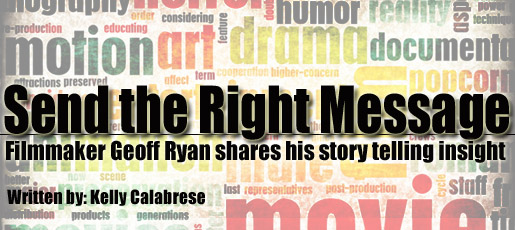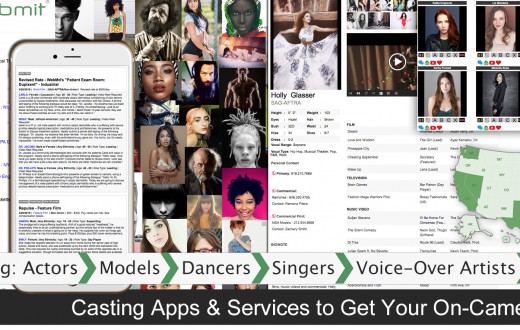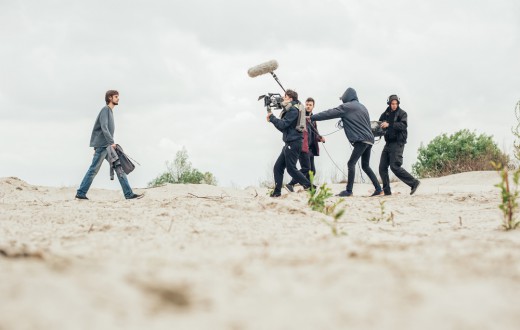Across all mediums – Film, TV, Print, Online, Green Screen – artists strive to create an unforgettable experience that audiences will relate to. For that to happen… you’ve got to honestly convey the story’s message.
“The message is most important and everything else must grow from there,” says artist Geoff Ryan, creator of Spork Productions – a company that focuses on inspiring and engaging audiences through an innovative approach to media and a personal touch.
Over the past 15 years, Geoff’s career blossomed from a young artist featured in the Portland Art Museum’s “Emerging Artists” exhibit to running the international ad campaign for the NYFA, building a new branding image for Nautica with the “Navigate Life” campaign concept and directing the feature length motion picture “Fray.”
 By working on a variety of mediums, Geoff Ryan learned how to take any message and deliver it in the most memorable and impactful form for the audience.
By working on a variety of mediums, Geoff Ryan learned how to take any message and deliver it in the most memorable and impactful form for the audience.
Here’s what he has to say about defining a message and keeping it strong across all mediums…
Q&A with Geoff Ryan – filmmaker, artist, musician and owner of Spork Productions.
Q: What does it means to create a strong artistic message?
For me, it really stems from early on, when I was still in high school. I did my first film based on an experience I had, based on youthful anger, and unknown to me I dealt with it a fairly mature way. It ended up going to festivals and I got letters from people saying it enlightened them as to ways to look at censoring and social responsibility. This early experience cemented the way I feel about an artistic message and that is… any issue that I feel passionate about is a potential subject for a film but also I need to have awareness of its impact when I put it out there.
My goal is to inspire. Whether it is a positive message or a negative message, I want to create something that allows people to understand a side of humanity they would not normally be exposed to. I like to show the beauty of the life that we have even if it is through the struggles people go through, by showing the fragile beauty of that struggle.
Q: How can artists strengthen and develop a message?
That’s a fun question. I put myself into an isolation of sorts. When I am writing, I totally immerse myself in my work. If you are having conversations with me during a process, it is probably redundant because I only talk about one thing.
I live in the world I am creating, whether it is fictional or based on reality.
Like for the film I am currently working on, Fray. It is about homeless veterans and I ended up spending a lot of time with them, listening to their stories. There was no way I could know what they went through in combat but I could learn what their experience was back here at home.

I guess I am a method version of a writer.
I want to make sure that I do the story justice. I want it to be authentic. If there is not a level of believability, you will lose your audience.
Q: While doing justice to a story’s message, how can an artist maintain their own style?
I’ve been told for a long time that I am very different from other artists out there, in that I do not have a discernable style. There are very few projects of mine that you can look at and say, “this is definitely a Geoff Ryan piece.”
For me, it is all about finding the message and letting the message determine the style whether it is a movie about veterans, a hard core metal song or a commercial about preppy clothing. All three are different messages and require a different esthetic. It’s not about my style or my personal image, it’s about the message of the story. In that way, I enjoy being a chameleon of sorts. I enjoy doing one project where I bring in old lenses and another that is clean and polished or on green screen. I love to have that flexibility. I focus on the message and submersing myself in it and then let that define how I accomplish it.
Part of this is my experience as an editor, to be able to say, “I love this scene, it is a great scene, but the film is better without it.”
For any artist or actor, they may be in love with a certain dynamic of their character. But at the same time it may take away from who the character is. So it’s not about getting caught up in what you enjoy about it, but what is right for that piece.
Q: How do you get your message/story to the right audience?
When I’m working in the low budget independent film world it is about trying to get the project to completion and then trying to find an audience for it. This is probably not the best advice because everything you read says you have to have a plan. But I got advice a while back from a mentor who said, “If you really want to be successful, the best way is to do what you love, do it the best way you can and then hope to hell that somebody likes it.”
With this industry, there are so many roads to achieving your goals that you can feel like you are on the wrong road – but you may not actually know.
I have known actors who do everything right and are still struggling, And, I know people who have gotten one lucky break and are set. It goes back to what my mentor said… do what you love and hope that someone likes it. If you are in it just for the success, you are not in it for the right reason. It is a brutal industry in that regard.
 I met an actor for one of my earlier films, Cult of Eden, through NYCastings, who has done some amazing things. And I worked with him on two other films since then, including Fray. But he constantly gets the same response from agents – that he is an amazing talent yet hasn’t done anything big enough for them to sign him. Now, he has done it all and people ask him how. He did because he had to. It wasn’t about doing a project that was good for his career. It was about working on a project he wanted to be a part of.
I met an actor for one of my earlier films, Cult of Eden, through NYCastings, who has done some amazing things. And I worked with him on two other films since then, including Fray. But he constantly gets the same response from agents – that he is an amazing talent yet hasn’t done anything big enough for them to sign him. Now, he has done it all and people ask him how. He did because he had to. It wasn’t about doing a project that was good for his career. It was about working on a project he wanted to be a part of.
I feel the same way. When I work on a film, I want everyone in my projects to be excited about it and that does sort of help with the promotion. Anyone who is a part of my film, talks about it. My films get a lot of word of mouth because people are inspired by them.
Q: How does an artist keep communicate a strong message across different mediums?
The thing I love about all mediums, is that there are many ways to communicate to an audience. Whether it is a movie, a song or a social media site, the medium is the message.
When you do a film, you are working with sounds, images, a narrative, arcs of story and subtext. There is so much to work with. If you have silence, you are creating emotion through that sound and the visuals are the grandeur of it. There is no element that is lesser than another. You can have the greatest performance in the world, but if the sound is off it can be for nothing. That, for me, is an important part of creating any project – there is no lesser object than any other.
Q: How important is it to be adaptable to different mediums?
I think it is essential in today’s industry. It gives actors more control over their career. There are so many actors now that have their own production companies, even if it is just doing viral videos. Five or ten years ago, the thought of A-list actors doing small videos would have be ridiculous. But now it’s huge. It’s important to keep your options open in that regard.
The market is changing so much and, for this next generation, entertainment is online. It is what’s on their computer. So it’s important to keep our options open and not look down on any kind of medium.
Even Reality TV. I had a great conversation with people I work with about Reality TV and they mentioned it is an atrocity. But how is it any different, in concept, then what we did in our feature film? For a lot of the roles we used real people. If we shot at a lumber mill or gas station, we used people who actually worked there. To acquire those types of people would have required a huge budget and their performance gave it a level of reality that would have been hard to achieve with actors. Instead of an actor trying to create a story, you go out and find that person and put them on TV. It is another way to tell a story. Instead of fictionalizing it, you find the real deal. Just because the majority of Reality TV is being used in the most exploitive way possible, doesn’t mean the concept isn’t a good idea.
Q: You work a lot with green screen, does that make it harder to get a strong message across?
I find it almost comical that actors are intimidated by green screen because I don’t know any trained actor who hasn’t done black box theatre. You are in a room with no props and have to make it come to life.
The difficulty in green screen really comes in the planning for it, just as it does in theater. In film, you can do it improvisationally. You can show up on set and figure it out. In green screen, you have to figure it all out beforehand and that takes acting back to its roots where you have to make something out of nothing. In a theatre, you have to pretend you are not looking at an audience and for green screen you have to pretend that you are looking at something that isn’t there. It gets back to the essence of what their craft is about.
The biggest problem with green screen comes with production. Photographers, and the people on set, think of themselves as having the final say. But for green screen it is out of their hands as to how it will look in the end. That is where it gets interesting, where post production becomes more pivotal.
Q: How does social media affect how an artist gets their story out there?
I love the idea that social messaging is all about bringing an online version of your offline audience.
Thanks to things like Facebook, you can actually have a bigger online audience than an offline audience. The difficulty is in being able to get that online audience to become a palatable force in a project. It’s easy to FAN something on Facebook and forget about it. How do you keep them engaged and have them be something more than an number? How do you get them to turn out for an event? Or, in the commercial world, to buy products? That is the most difficult part versus racking up as many fans as possible.
It has opened up a new world because the internet is becoming entertainment. Whether it is viral videos or rethinking ways people distribute films.
If you create a film with its final destination point being online, you have to think about how that affects the way you tell the story and shoot it. Do you do it in 5 or 10 minute segments? The beauty, and the difficulty of it, is that you can do it cheaper but there are very few ways to make your money back unless you have commercials and sponsors.
In a way, social messaging gets back to the old, old days of storytelling where you throw something out there and it is open to anyone. Back then, artists didn’t make millions of dollars. In fact, they were pretty broke. We are going back to that time where there are limitless possibilities but it is harder to make a living off of it.
People talk about filmmaking and that Hollywood doesn’t put out anything good. But the good stuff isn’t profitable anymore. You’ve have blockbusters or indie films. There are very few directors who have the luxury of doing those middle level films. You are either skating by with as little as you can live on or you are ridiculously rich with blockbusters.
Things have changed and the online world is where a lot of it is going. Part of the reason why I jumped in is because I want to be part of the content creation instead of trying to catch up in five years. And I enjoy it. It is a creative medium to create an online destination for people. To figure out how to bring in an audience and keep them engaged. It is similar to storytelling, without the narrative.
Q: It seems as if you have a lot of internal strength and power. Any advice to share with other artists/actors?
That is a tough one. Even sometimes I fail at it.
It is hard to trust your instincts because, in the end, it will come down to what the audience thinks. I guess it comes down to testing yourself.
Speaking in example, I did an experiment a number of years back where I chose a genre that I detest and decided to write a script for it. That script was great because I didn’t care. I went totally over the top, did not censor or limit myself and it ended up being the best script I had written up to that point. I realized that I needed to trust myself more, to not over think, to literally allow myself the freedom to make choices.
In the end, it is not life or death if you do a bad film. But if you are afraid to be wrong, you will never have an original idea.
I think that is the best way to sum it up – to not be afraid to be wrong.
Thank you, Geoff Ryan, for sharing the importance of doing justice to a story’s message without too much self-judgment or over thinking it!
For more info and insight from Geoff Ryan, visit www.sporkproductions.com







